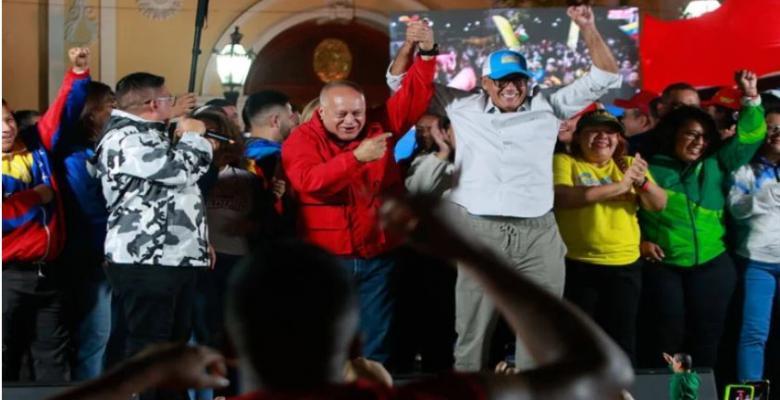Great Popular Victory in Venezuela
especiales

The Great Patriotic Pole, representing Chavismo, achieved a resounding victory in Venezuela's regional and legislative elections held this Sunday, obtaining 82.68% of the valid votes for national list deputies, according to the official results announced by the National Electoral Council (NEC).
Remember that the Venezuelan people went to the polls to elect the 285 deputies to Parliament, 24 governors, and 260 legislators.
The ruling alliance won 4,553,484 votes out of a total of 5,507,324 votes cast, securing 40 of the 50 seats up, as well as 23 of the 24 state governorships, only losing in Cojedes.
The participation on the voting reached 42.63% of the active electoral roll, with more than 5.5 million Venezuelans exercising their right to vote in a day described as arduous but successful for the Venezuelan electoral system.
The results reflect a wide lead for the ruling party over the opposition forces. The Democratic Alliance, the main opposition coalition, obtained 344,422 votes (6.25%), followed by the United National Unity Alliance with 285,501 votes (5.18%), and the Neighborhood Force Alliance with 141,566 votes (2.57%).
The remaining votes, including void ballots and other minor options, totaled 182,351 votes, equivalent to 3.31% of the total. These figures consolidate Chavismo's electoral dominance in the Venezuelan Parliament for the next legislative period.
For these elections, Operation Republic was deployed in more than 15,000 polling stations nationwide with more than 490,000 officials, including 412,000 members of the Bolivarian National Armed Forces (FANB), who will ensure civility during the voting process.
MEANING
The results sets a new victory for the political project initiated by Hugo Chávez and continued by Nicolás Maduro, reinforcing the governmental management of the Revolution in a context of international economic and diplomatic challenges promoted primarily by Washington.
It was demonstrated that the Venezuelan people are the protagonists and decide the destiny of the country, with the in-depth work of NEC officials and the Bolivarian Armed Forces of Venezuela, who dismantled and prevented aggressive actions to destabilize the process, in which more than 400 international observers were present.
In short, it was a consistent victory for the people after the violent days that followed July 28, 2024, when fascist far-right groups attempted to create chaos in the country. In practically 24 hours, peace was restored throughout the country.
MADURO
Venezuelan President Nicolás Maduro, who was sworn in for a third term in July last year, asked this Sunday that "no one interfere" in the territorial dispute with Guyana over Essequibo, a territory of almost 160,000 square kilometers, where elections took place for the first time in more than 200 years, electing a Chavista governor despite threats from the Guyanese government.
"The Essequibo people elected their national representatives, all peacefully, constitutionally, and legally, so no one interferes in this historic dispute," he stated.
He also said that Guyana's president, Irfaan Ali, whom he described as an "ExxonMobil employee," will have to sit down "sooner rather than later" to talk and "accept Venezuela's sovereignty."
Maduro maintained that the vote in the newly created Guayana Esequiba state, which is being held in two parishes of Bolívar state (southern, bordering Brazil), is an "exercise of real sovereignty."
"The Cooperative Republic of Guyana has been an illegal occupier, a legacy of the British Empire, which illegally occupied that territory, and they have destroyed it. Illegal mining has shattered its beauty, biodiversity, and rivers," he stated.
The president assured that with the election of a governor, with a budget, and with his full support, Guayana Esequiba will be recovered for the citizens who live there.
CAPRILES
Venezuelan opposition leader Henrique Capriles, who won the National Assembly deputy seat, described this achievement as "the least important thing" while defending participation in these regional and legislative elections as a means of political struggle.
"For me, the seat is the least important thing," the two-time presidential candidate told the press after voting in Caracas.
The anti-Chavez candidate considered that the opposition—represented by intervened and minority parties—is absent in the Venezuelan Parliament and stated that Venezuelans have "regretted" each time they have abstained.
"I believe the opposition has to be present in any space (...) What is better? To have a voice and fight within Parliament or, as we have done on other occasions, to withdraw from the electoral process?" and leave Parliament entirely to the Government?" asked the politician, who in recent times has shown his disagreement with right-wing extremists who call for violence.
Translated by Amilkal Labañino / Cubasi Translation Staff













Add new comment